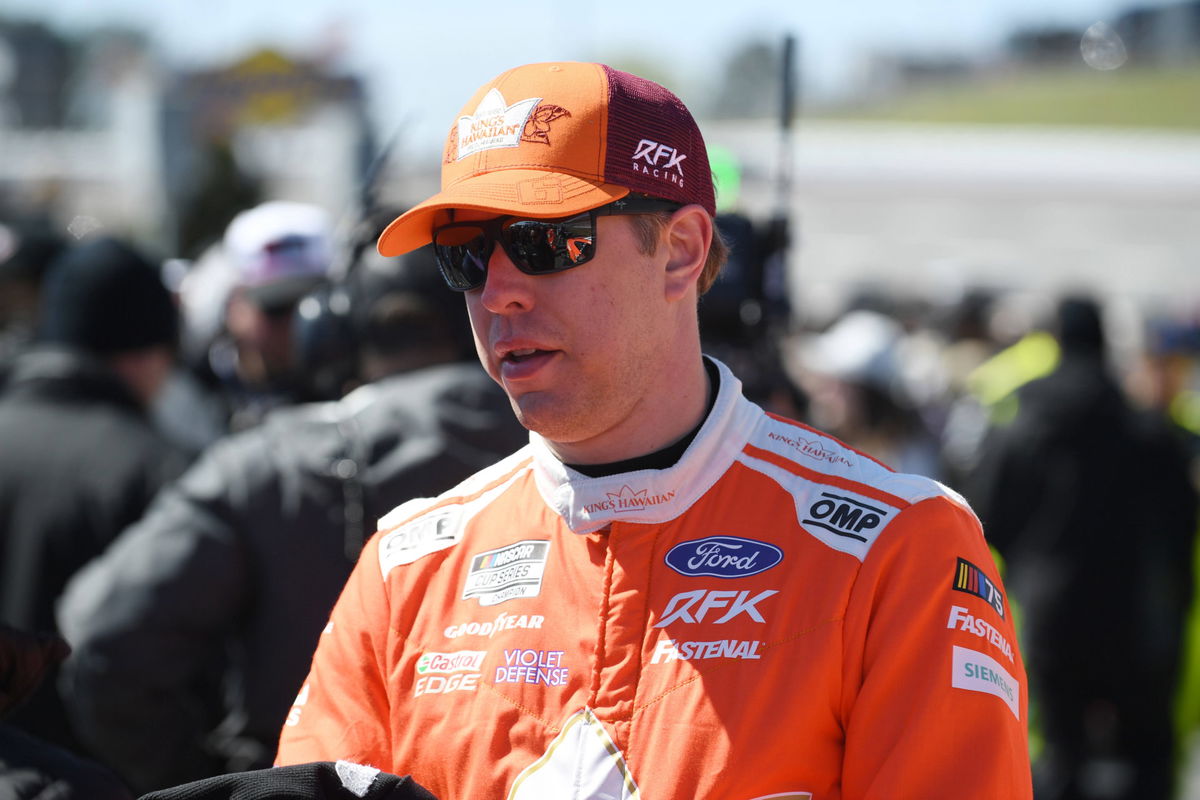Jun 11, 2025 | 4:42 PM EDT

Imago
ATLANTA, GA – MARCH 19: Brad Keselowski ( 6 RFK Racing King s Hawaiian Ford) looks on before the running of the NASCAR. | Image credits – Imago

Imago
ATLANTA, GA – MARCH 19: Brad Keselowski ( 6 RFK Racing King s Hawaiian Ford) looks on before the running of the NASCAR. | Image credits – Imago

Imago
ATLANTA, GA – MARCH 19: Brad Keselowski ( 6 RFK Racing King s Hawaiian Ford) looks on before the running of the NASCAR. | Image credits – Imago

Imago
ATLANTA, GA – MARCH 19: Brad Keselowski ( 6 RFK Racing King s Hawaiian Ford) looks on before the running of the NASCAR. | Image credits – Imago
“Still not sure how we got speeding penalty from Sunday. Our incar telemetry shows 59.4mph where NASCAR’s system showed 60.9mph.” Brad Keselowski’s words echoed through the NASCAR world after a pit road penalty at Michigan’s FireKeepers Casino 400 on June 7. The RFK Racing co-owner was baffled; his No. 6 Ford was slapped with a speeding call that turned a potential podium into a frustrating 10th-place finish.
Watch What’s Trending Now!
The 1.5-mph discrepancy between his team’s telemetry and NASCAR’s timing loops sparked a firestorm, with Keselowski and fans questioning the system’s fairness at a track where Ford’s legacy runs deep. Starting 27th, Keselowski clawed to 21st by Stage 1’s end, but early pit stops for fuel cost him track position. Stage 2’s late speeding penalty was a dagger, dropping him to 24th. Yet, the 2012 Cup champ showed grit, weaving through restarts to finish 10th, just behind teammate Ryan Preece and ahead of Erik Jones.
All three RFK drivers—Chris Buescher nabbed second, cracked the top 10, a rare bright spot in a season where Keselowski’s 32nd in points with five DNFs. “We had a top-two or top-three car, I felt I was way slow, so getting called fast didn’t add up,” Keselowski said, gutted. His doubts fueled conspiracy chatter, especially when Todd Gilliland, penalized at the same time, chimed in on X: “I got one right in front of you, by a lot… didn’t even think I was close.” Was NASCAR targeting Ford at their Michigan stronghold? But one voice cut through the noise—an ex-NASCAR star calling Keselowski’s excuse “unreliable,” shutting down the penalty backlash with cold, hard math.
Keselowski gets schooled on pit road math
Landon Cassill, a former NASCAR driver turned analyst, didn’t mince words when he dove into Keselowski’s Michigan penalty drama. Posting on X, Cassill broke down why the RFK star’s telemetry defense fell flat. “The final section of pit road at Michigan is a tricky one, which likely led to Brad’s speeding penalty,” he wrote, before unpacking the technical nitty-gritty. NASCAR measures pit road’s section 18 at 76 feet, calculating speed by time between timing loops. Drivers must cross it in no less than .86364 seconds to stay under the 59.99-mph limit—55 mph plus a 4.99-mph buffer.
Here’s the kicker: the actual section is 75.8 feet, not 76. Cassill explained that this tiny mismatch means drivers hitting 59.99 mph would still get flagged for speeding, as NASCAR’s math assumes the longer distance. To stay legal, drivers need to dip to 59.84 mph. “Brad’s GPS data says something different, but the GPS data isn’t reliable to the level of accuracy needed,” Cassill stressed. He dug deeper, noting sections 16 and 17 measure longer than NASCAR’s calculations, letting drivers push past 61 mph without a penalty. Cassill estimated Keselowski was rolling at 60.5 mph entering section 18—0.65 mph too fast—aligning with NASCAR’s 60.97-mph reading.
The final section of pit road at Michigan is a tricky one, which likely led to Brad’s speeding penalty. I’ll explain:
NASCAR measures section 18 at 76.00 feet. Because NASCAR calculates pit road speed by time between sections, drivers are allowed to travel through section 18 no… https://t.co/z0w1YhwT87
— landon cassill (@landoncassill) June 11, 2025
Cassill’s breakdown left little room for debate. Keselowski’s team telemetry, likely GPS-based, couldn’t match the precision of NASCAR’s loop system, which uses pavement-embedded sensors. Fans on X were split: one called Cassill’s post “a masterclass in shutting down excuses,” while another grumbled, “NASCAR’s system’s still fishy.” Gilliland’s penalty, clocked simultaneously, backed Cassill’s point—section 18’s quirks caught multiple drivers. Keselowski’s frustration was real, but Cassill’s math painted it as driver error, not NASCAR conspiracy.
The backlash didn’t end there. Keselowski’s penalty was one of 22 infractions at Michigan, with Chase Elliott and Kyle Larson also hit for pit road issues. Social media buzzed with RFK fans crying foul, because of the harsh treatment Chris Buescher received after Kansas. That’s not it, Ryan Preece’s runner-up finish at Talladega was chalked off due to a spoiler violation. So, fans were seeing a pattern that was aimed at RFK Racing drivers, and the Michigan jolt seemed like a final straw for them.
This wasn’t Keselowski’s first penalty rodeo. RFK’s faced heavy fines before, like a 100-point deduction in 2022 for modifying a supplied part. The team’s appeal then, like their Kansas appeal this year, showed Keselowski’s knack for fighting NASCAR’s rulebook, which he’s compared to the IRS tax code for its complexity. But at Michigan, Cassill’s takedown shifted the narrative: the driver, not the system, miscalculated. Meanwhile, the veteran driver/co-owner is keeping a close eye on the charter situation that might provide his team with an opportunity to expand.
RFK Racing might have three permanent charters soon
The U.S. Court of Appeals’ decision to revoke the charter status of 23XI Racing and Front Row Motorsports has sent shock waves across the Cup garage. If the ruling stands, both teams will have to surrender their charters, and this also includes the charters they bought from Stewart-Haas Racing. There is no clarity on what will happen to the SHR charters if the two teams are fielding open cars for the rest of 2025.
There’s speculation going around that NASCAR might put these two charters on sale. The charters are currently valued at $45 million, and this will be a significant hit to 23XI and FRM, who no longer enjoy the provisions for being a charter organization. Keselowski has been watching this case unfold and is hoping for a quick resolution between the two parties. But, if he is provided with an opportunity, he won’t back out on expanding his team.
“I just wish the whole thing would find a peaceful resolution and the sport could kind of move on,” he said. “I think there’d be a long list of suitors…but you know RFK has a lease agreement currently with Rick Ware Racing…certainly we’re keeping our eyes open.” Well, if the charter is on sale, RFK Racing is going to bid for it. But in the meantime, they will have to shift their focus to the Mexico City race weekend. They have a bigger fish to fry than charter discussion, as none of the RFK Racing cars have qualified for the playoffs.



